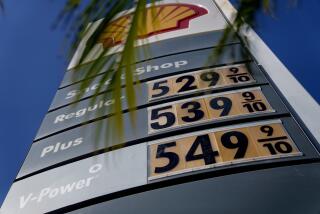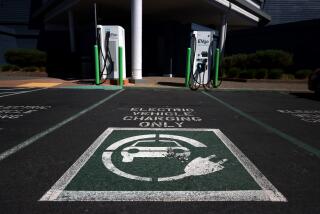Fuel-efficient cars boost automakers’ February sales numbers
Americans are buying cars at a faster rate than they have in four years as rising gas prices and easier-to-get financing are driving more buyers to dealership showrooms.
Bolstered by a surge in sales of fuel-efficient vehicles, automakers sold cars at an annualized sales rate of 15.1 million in February, which coincidently marked the industry’s best performance since the February of the last leap year in 2008.
They are selling to buyers such as recent college graduate Lindsey Roberts, an Atlanta resident who went shopping earlier this month to replace her 12-year-old Chrysler that got less than 20 miles per gallon.
Roberts bought a Hyundai Elantra compact sedan that she says is getting close to 40 mpg during the first two weeks she’s owned the car.
“It’s such a difference,” Roberts said. “I barely ever fill up my tank, which is really amazing.”
The national average price of a gallon of regular fuel hit nearly $3.70 this week and stood at $4.29 in California, according to the AAA Fuel Gauge Report. Prices are up 10% to 15% from a year ago, depending on the region.
That’s created increased demand for small cars that have good fuel efficiency.
“Fuel economy remains top of mind for consumers,” said Bob Carter, the Toyota brand’s U.S. sales chief.
This is showing up in sales data. Sales of the Ford Focus compact sedan, for example, more than doubled in February compared with the same month a year earlier. Honda sold more than 27,000 Civics last month, a 42% gain from a year earlier. Toyota Prius hybrid sales rose 52% to more than 20,000. Sales of Chevrolet’s tiny Sonic hit 7,900 in February, almost triple the Aveo model that it replaced.
A better economy is contributing to the industry’s upswing, which started last fall and has gained strength through the winter months as Japanese automakers recovered from inventory shortages caused by last year’s earthquake in Japan and flooding in Thailand.
“You look at the various things happening out there in the economy. Claims for unemployment are coming down. Jobs are being created. While we would like it to be better, consumer confidence is on the upswing,” said Erich Merkle, sales analyst at Ford Motor Co.
People also need to replace their vehicles. The average age of cars is approaching 11 years because people put off buying new vehicles during the recession and subsequent years because they were worried about their jobs.
Looser consumer credit also is pushing sales. Leases, which almost died away during the recession, now account for about 20% of the market. Dealers also are selling more vehicles with 72-month loans because of easing credit conditions.
“We’re seeing a rebound in leasing and a slight improvement in credit availability, which is bringing customers that were shut out of the market two or three years ago back into dealerships,” said John Humphrey, senior vice president of global automotive operations at J.D. Power & Associates. “Both of these elements bode well for consumers in terms of making vehicles more affordable, which will drive more traffic into showrooms.”
The industry sold more than 1.1 million vehicles in February, a 15.7% gain from the same month a year earlier, according to research firm Autodata Corp.
The domestic automakers — long dependent on big pick-up trucks and sport utility vehicles for the bulk of their sales — are now better positioned to compete against the historically more fuel efficient models of the Asian brands than they have been in previous price spikes.
“A few years ago, higher fuel prices were a major threat to our total vehicle sales; whereas today those higher prices have become far less of an issue,” said Reid Bigland, Chrysler’s sales chief. “We now have 13 vehicles with an EPA-rated highway fuel economy of 25 miles per gallon or higher, and six of those vehicles get 31 mpg or higher.”
Chrysler’s U.S. sales rose 40.4% compared with the same month a year earlier to 133,521 vehicles, Autodata said.
Likewise, as recently as three years ago just 16% of the vehicles GM sold achieved 30 mpg highway. Today it is 40%, said Don Johnson, GM’s vice president of U.S. sales. GM, which had a strong prior February, posted a 1.1% sales increase to 209,306 vehicles.
Analysts will be looking to see if the strong sales numbers continue as the year progresses or were a short-lived trend boosted by conditions that won’t repeat in future months.
Mild winter weather in the Midwest and Eastern seaboard as well as an extra day in the month this year allowed for more car shopping than in February 2011.
Japanese brands had a better supply of vehicles after recovering from production disruptions caused by the Japanese earthquake and flooding in Thailand last year. Additionally, some manufacturers started to deliver vehicles in greater numbers to the rental car companies in February to fulfill sales commitments made late last year.
Toyota Motor Corp. sales grew 12.4% to 159,423 vehicles, and American Honda Motor Co. saw sales increase 12.3% to 110,157 vehicles.







